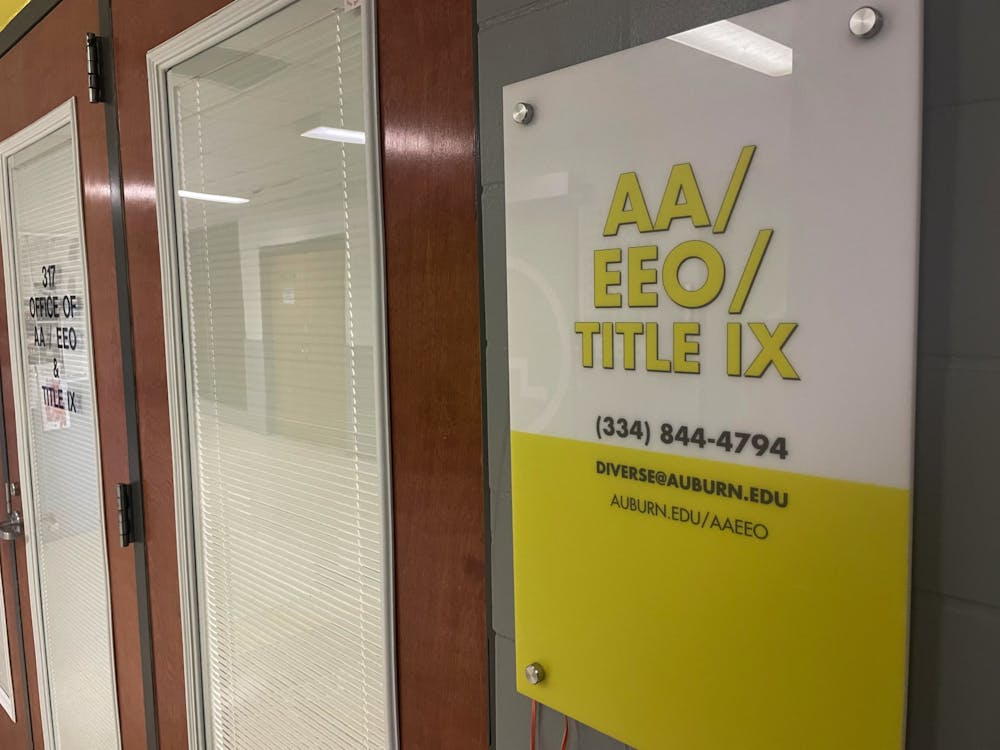On Feb. 16, The Plainsman received a tip outlining a student’s experience with Auburn’s Title IX office and the investigative process.
This came as a result of a previous article published by The Plainsman in which Title IX Coordinator Kelley Taylor and Deputy Title IX Coordinator Katherine Weathers laid out the purpose of their office and how its processes are supposed to work.
The student detailed their experiences with officials working in the office, as well as what appeared to them as a mishandled investigation.
The student had initially gone to the Safe Harbor office—who they said provided phenomenal assistance—to seek resources after they allegedly experienced sexual abuse in a past relationship. After their visit, they were referred to the Title IX office where they filed a formal complaint.
The student met with Weathers upon visiting with their survivor advocate from Safe Harbor. Weathers described the process in its entirety to the student and noted the frequency in which investigations end in favor of the respondent.
According to Taylor, 30% of respondents are found not responsible in a full investigation, as opposed to 70% who are found responsible. Of those found responsible, Taylor said that 80% are suspended or expelled from the University.
While the student’s story did include mention of some of these statistics, their main concerns were with how their investigator treated them throughout the investigation, as well as how Weathers handled certain procedures towards the end of the student’s investigation when they requested an informal resolution.
Title IX’s informal resolution process is essentially a mutual agreement between a complainant, their respondent and the Title IX office. The process must first be requested by either party and accepted or denied by the other. If accepted, the requesting party can come up with terms that can be edited by the other two parties involved.
The student’s interactions with the Title IX office happened between October 2022 when they filed a formal complaint and February 2023 when the terms of an informal resolution were agreed upon by all parties involved. The student said that their first interview with their investigator lasted approximately two hours.
“In my interview, [with] a lot of details in terms of circumstantial things I can’t remember because I was diagnosed with PTSD, and no one had asked me to give any information like why I had faults in memory,” the student said. “[The investigator] kept getting frustrated with me when I couldn’t remember certain details, and it was after [the investigator] kind of snapped at me, there was another woman in the [Zoom] call kind of observing, I remember her cutting [the investigator] off after I struggled to respond to [the investigator] kind of raising [their] voice.”
The student explained their PTSD diagnosis to those in the Zoom call. According to the University of Washington, 81% of sexual assault survivors experience symptoms of PTSD just a week after experiencing sexual assault, and 75% still experience symptoms a month after when PTSD can formally be diagnosed.
“I’m able to remember the traumatic experiences in terms of, like, a lot of the big moments, but a lot of the small detail stuff is really hazy,” the student said. “And anyone with a very minimal knowledge of trauma would know that that is a basis of PTSD.”
Even after this initial outburst by the investigator, the student said they continued to get easily frustrated throughout the remainder of the interview.
“At one point when I was talking about things that led up to certain cases of assault, [the investigator] said to me at one point that even though I hadn’t given verbal consent, somehow I’d given physical consent,” the student said. “[The investigator] was very much accusing me of kind of making false accusations.”
Following this, the student maintained contact with their investigator largely over email, and while the student described their correspondence after that as largely professional and seemingly standard, one interaction left the student feeling targeted by the investigator again.
“A week or two after my interview, [they] sent me [their] draft summary of our interview together, and one of the events of my assaults involved choking, and I had very much so explained clearly in my interview that what had happened made it to where I couldn’t breathe and was something that was very debilitating,” the student said. “When the summary came out, [they] had worded it as if my respondent had only placed pressure around my neck.”
The student said that this was dismissive of this particular instance of assault and made it seem like the action of little importance. The investigator also allegedly did not use proper Title IX terminology. In this case, the investigator did not use terms such as “choking” or “strangulation” and only went as far as to say “pressure being applied to the neck that caused pain,” according to the student.
While Taylor said every respondent and complainant has the ability to request a change in their investigator if they feel they are acting inappropriately or unprofessionally, the student said that they were unaware of this.
Taylor provided The Plainsman with a clause that is in every Notice of Investigation, including the complainant in this case:
The Investigating Officer assigned to this complaint is NAME. You have a right to challenge the choice of any investigator due to conflict of interest or bias by notifying me.
This is sent at the beginning of each investigation, so there is a possibility that both parties could forget this or believe it only applies at the beginning of the investigation due to an immediate conflict of interest or bias.
Aside from the student’s experience with their investigator, they also noted behaviors on the part of Weathers they found concerning. However, the student initially trusted Weathers when their investigation began. It was not until a request of an informal resolution that the student thought Weathers was working against them.
After a final report was drafted, the student decided to pursue an informal resolution because they had waited approximately a month after their final instance of abuse to report and no longer had physical evidence or marks to show as evidence. The student also said they felt defeated after going through the entire process and wanted it to end.
They felt an informal resolution would be the best route as it would ensure the respondent faced some repercussions for their alleged actions.
However, the student drafted their terms for the informal resolution and sent them to Weathers to review and send to the respondent. Once Weathers received the draft terms, it took nine days before the student decided to reach out and inquire about why they had heard nothing regarding the resolution.
Weathers responded by saying that the respondent had requested an extension to review the terms, and the student felt that it was wrong on Weathers’ part to not inform them of this extension, citing Title IX policy that, according to Taylor, applies to the formal process.
“In the formal process, we notify both parties of updates at the same time,” Taylor said. “The informal resolution process is more flexible. Sometimes a party in the informal process requests an extra day or two to review the terms because they need to meet with their Title IX advisor or for some other reason. In a case like that, the other party would not typically be notified.”
Furthermore, Taylor said that the office tries to treat all parties equitably throughout any process and that Title IX facilitators should strive to update both the complainant and respondent as often as possible.
The student said that their main issue with the lack of communication was that they felt the respondent was being treated more favorably than they were.
After hearing from Weathers about why the terms had not been returned for final approval from all parties, the student said that edits had been left on the draft—edits that altered a portion dealing with more local, hands-on non-profits and were made by the student to ensure that the respondent did not get out of service projects on technicalities.
These particular edits suggested that the Auburn-Opelika area-specific non-profits be changed to all non-profits, something the student worried the respondent would use to find something they enjoyed doing, making it more of an activity rather than a lesson or work.
The student requested a brief extension to review the terms and returned with one suggestion: the respondent must do non-profit work in any location so long as it pertains to garbage collection or providing for the homeless.
Weathers suggested a change that would eliminate the part about garbage collection and instead focus solely on feeding the hungry or providing shelter or essentials. The student agreed and Weathers sent the terms but soon notified the student of a slight change she made without the student’s consent.
The change was small, but the student feared that when Weathers added that the respondent could provide shelter or essentials, particularly to families in need, the respondent would take advantage of the change and use their family to fulfill their service work requirements for them.
“It was upsetting because it means that he could have his parents provide shelter for people who need it and get most of his hours done that way, and he wouldn’t even have to move a finger,” the student said.
Though the Title IX office did not break any policy or procedure, the student felt as if they were left uninformed on how certain—and important—things worked throughout the process.
The student also felt as if the office worked against them through both their investigator and Weathers.
“At the end of the day, the reason why I’m doing this is because campus sexual assault, no matter where you go, is one of the biggest issues on all college campuses, and it happens to so many people,” the student said. “There’s a lot of work that has to be done socially to attack the issue head-on. But outside of that, there should be places where people who go through this and survived this to go where they can just report and feel safe reporting or have resources to help them.”
Do you like this story? The Plainsman doesn't accept money from tuition or student fees, and we don't charge a subscription fee. But you can donate to support The Plainsman.

Tucker Massey, senior in journalism, is the content editor for The Auburn Plainsman.





